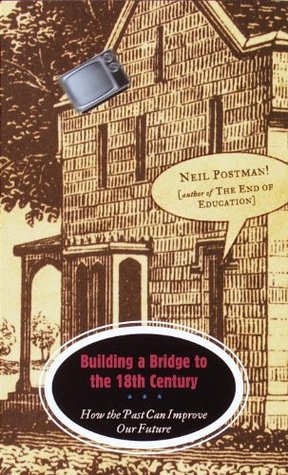More on this book
Kindle Notes & Highlights
by
Neil Postman
Read between
February 27 - March 3, 2022
No loom to weave facts into fabric, people with no gods to serve, hollow and anxious, distrusting language, uncertain about even the most obvious features of reality, lacking conviction, suspicious of truth.
But it may be said here that when people do not have a satisfactory narrative to generate a sense of purpose and continuity, a kind of psychic disorientation takes hold, followed by a frantic search for something to believe in or, probably worse, a resigned conclusion that there is nothing to find.
There is no escaping from ourselves. The human dilemma is as it always has been, and it is a delusion to believe that the future will render irrelevant what we know and have long known about ourselves but find it convenient to forget.
Let us not turn to the eighteenth century in order to copy the institutions she fashioned for herself but in order that we may better understand what suits us. Let us look there for instruction rather than models. Let us adopt the principles rather than the details.
The most obvious question to be asked about any new technology—for example, interactive television, virtual reality, the Internet, or, for that matter, doorknobs and toasters that “understand” human speech—is, What is the problem to which this technology is the solution?
What new problems might be created because we have solved this problem? The automobile solved some very important problems for most people, but in doing so, poisoned our air, choked our cities with traffic, and contributed toward the destruction of some of the beauty of our natural landscape.
What sort of people and institutions might acquire special economic and political power because of technological change? This question needs to be asked because significant technological change always results in a realignment of power.
What changes in language are being enforced by new technologies, and what is being gained and lost by such changes?
Einstein struggled mightily with the force of conventional and habitual meanings, as for example of “time,” “space,” and “simultaneity.” Like Humpty Dumpty in Through the Looking Glass, he knew that it is a matter of who will be the master of meaning, and in taking charge, he gave us his theory of relativity—the concept that time, mass, and length are not absolute but relative to speed and position.
In his book The Meaning of Relativity, Einstein wrote, “The only justification for our concepts and systems of concepts is that they serve to represent the complex of our experiences; beyond this they have no legitimacy.”
Heisenberg’s famous remark that we do not see nature as it is but only as a consequence of the questions we put to it.
Any fool can have an opinion; to know what one needs to know to have an opinion is wisdom; which is another way of saying that wisdom means knowing what questions to ask about knowledge.
The problem is how to transform information into knowledge, and how to transform knowledge into wisdom. If we can solve that problem, all the rest will take care of itself.
If we continue to read them, either science or scripture, as giving us Truth direct and final, then all their hope and promise turn to dust. Science read as universal truth, not a human telling, degenerates to technological enslavement and people flee it in despair. Scripture read as universal Truth, not a human telling, degenerates to … to what? To Inquisition, Jihad, Holocaust—and people flee it in despair. In either case, certainty abolishes hope, and robs us of renewal.
Democracy is not a thing, a process, or an idea. It is a word, and a word that has had a checkered career at that.
For Hobbes, the fundamental concern in governance was the maintenance of public order and so the avoidance of the mortal danger of anarchy. He was against the sharing of power and was not excessively troubled by despotism. Democracy in any form, he believed, would inevitably lead to anarchy.
Of course, reading, as St. Jerome noted many centuries ago, is an antisocial activity. What do we require of others when we are reading? Their absence. If not that, their silence. That is why the printed word promoted individualism. (“The scribal culture,” Eisenstein remarks, “held narcissism in check. Printing released it.”)
We might even say that “critical thinking” works to undermine the idea of education as a national resource, since a free-thinking populace might reject the goals of its nation-state and disturb the smooth functioning of its institutions.


